Finding the best solar power bank can make a real difference when you’re off the grid, traveling, or just want a reliable backup for emergencies. With so many options available, it’s not always easy to determine which ones are worth your money. Some are bulky and slow, while others offer fast charging, wireless features, and rugged designs that hold up in real-world conditions.
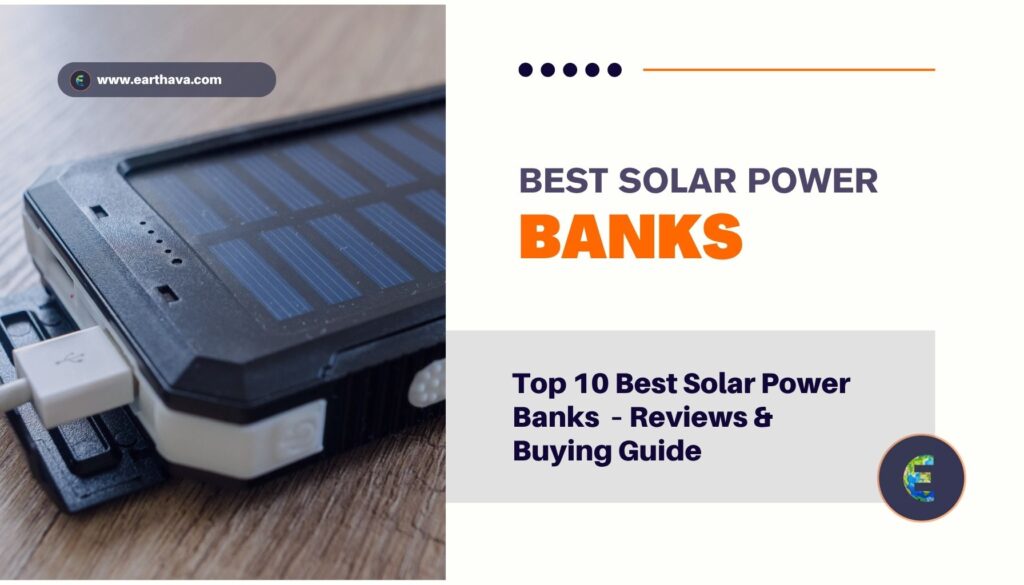
What to Expect from Solar Power Banks
Solar power banks sound like the perfect off-grid solution, and in theory, they are. The idea of using the sun to recharge your phone or flashlight on the go feels empowering and eco-friendly. But here’s the honest truth: solar charging is still a backup feature, not a primary one, at least for now.
Across all the models we reviewed, the solar panels are best thought of as emergency top-ups. Even the higher-wattage, multi-panel units tend to charge slowly in real-world sunlight, often taking days to fully replenish themselves. That doesn’t mean they’re useless, but it does mean you shouldn’t rely on the solar panel alone for everyday charging.
What these products do offer is a blend of practicality and peace of mind. As power banks, most of them perform really well, with large capacities, multiple ports, wireless charging, and bonus features like built-in flashlights or rugged, waterproof designs.
So why did we still put this guide together? Because the solar component does add value, especially for travelers, campers, and those building a go-bag for emergencies. These are the 10 best solar power banks on the market right now, based on specs, real-world reviews, and thoughtful design. Are they perfect? No. But they’re worth experimenting with if you’re solar-curious and want a power bank that does a little extra.
Our goal here is to help you choose realistically, not ideally, so you can invest in something useful, not just trendy.
Top 3 Picks
🥇Riapow 27000 mAh Wireless Solar Charger Power Bank
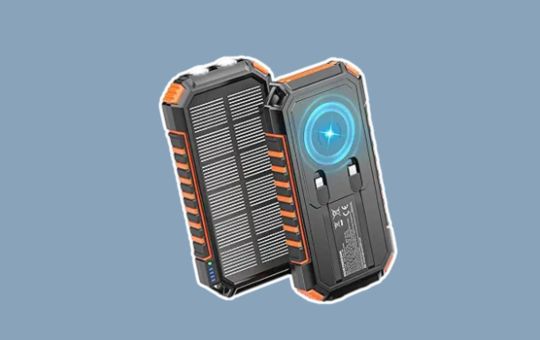
Summary
This power bank packs serious power and convenience, making it great for campers, travelers, or emergency kits. The built-in cables and wireless pad eliminate cable clutter, while the flashlight serves as a handy bonus. Solar recharging works, but very slowly. Think of it as a backup option, not your main charging source. Most users report solid charging performance via USB, but mixed results (and some failures) when relying on the solar panel alone.
🥈Jinepin 46,800mAh Solar Charger Power Bank
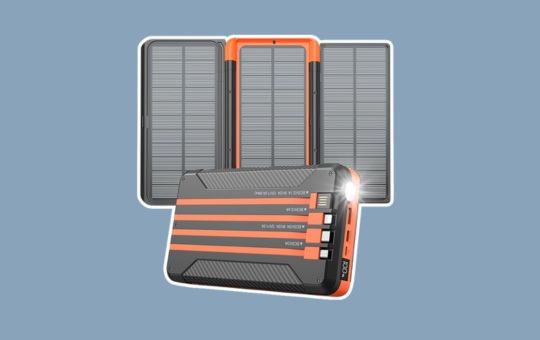
Summary
This Jinepin charger packs speed, resilience, and solar capability into a compelling all-in-one package, great for campers, road-trippers, or those prepping for emergencies. Its real highlight is the fast charging (20W) paired with multiple output modes. The solar panels are noticeably stronger than single-panel types, but still serve best as emergency top-ups. A solid performer, if you’re aware that solar is a convenience, not a headline feature.
🥉Hiluckey 25,000 mAh Solar Power Bank
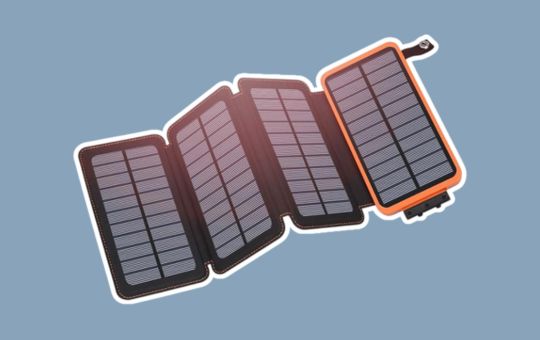
Summary
Built to withstand adventure, this power bank is ideal for camping or travel kits. It charges quickly via USB-C when plugged in, offers multi-device support, and is encased in a shock-resistant frame. Just don’t expect the solar panel to power things reliably; consider it a trickle-charge backup, not a main charging source.
Individual product reviews, key benefits, buying guides, and FAQs.
1. EcoFlow Solar Power Hat

You might be thinking, “Wait a second, this isn’t your average solar power bank,” and honestly, you’re right. It’s not your standard portable charger. But we included it in this list because it brings something refreshingly different to the table, a hands-free, wearable way to generate solar power that, in the right conditions, could actually be more convenient than traditional setups.
Best for: Hikers, campers, or off-grid travelers who want passive solar charging with sun protection
The EcoFlow Solar Power Hat isn’t your typical charging solution. It’s a wide-brimmed sun hat with flexible solar panels built into the brim, designed to charge your devices as you move through the day. It doesn’t store power on its own; instead, it connects directly to your device or a power bank via USB-C. According to EcoFlow and verified reviewers, it can reach up to 8W of output in strong, direct sunlight, enough to slowly top up a phone or keep a battery pack going.
What stands out most, based on user feedback, is the freedom it offers. There’s no need to stop and set up a solar panel; you just wear it, or clip it to your gear, and it gets to work. That said, it’s not perfect. Some users described the fit as awkwardly large, particularly in the L–XL version, and noted that the brim feels stiff due to the embedded panel. Performance also drops sharply in shaded areas, which is expected for any solar product, but still worth noting.
From what we’ve gathered, the Solar Power Hat seems best for people already comfortable managing off-grid gear, those who know how to chase the sun, and don’t mind something a little experimental. It’s not going to replace your go-to charger, but it’s a creative solution for trickle-charging while you’re on the move.
What Real Customers Say
Specs And Key Features:
| Price: | $99.00 |
| Battery: | It does not have battery. |
| Input: | – |
| Output: | 5V/2.4A. |
| Solar Panel: | Perc Monocrystalline Silicon. |
| Color: | black. |
| Weight: | 13 Ounces. |
| Dimensions: | Medium-Large:11.02 x 7.48 x 4.72 Inches Large-X-Large: 11.42 x 7.87 x 4.92 Inches |
| Waterproof: | IP65. |
| Key Features: | Wearable. |
2. Riapow: 27000mAh Wireless Solar Charger

Best for: Travelers, commuters, or emergency preppers who want high capacity and multi-device charging, without relying solely on solar
The Riapow 27,000mAh Solar Charger is a high-capacity portable power bank with a built-in solar panel and wireless charging, designed for users who want more flexibility in how they recharge their devices. While it’s not meant to function as a primary solar source (and most users agree on that), its standout strength is the combination of wired and wireless charging with solid capacity, all in a rugged body that’s ready for everyday use or the occasional camping trip.
The Riapow consistently shows up in user reviews as a dependable, all-in-one power bank that’s ideal for those who want to keep their devices running without fuss. The wireless charging is especially appreciated in real-world use, no cables, just set your phone down and let it charge.
That said, the solar panel shouldn’t be your main power source. Like most compact panels, it’s slow and sensitive to light conditions. But for occasional top-ups or in emergencies, it can offer peace of mind, especially when paired with the large internal battery.
It’s a great fit for people who are on the move, whether that’s road-tripping, spending long hours commuting, or building out a backup kit for power outages. It may not be the most ultralight or feature-packed solar charger, but it strikes a balance between versatility, storage, and ease of use that many users find reliable.
✅ Pros
- Charge multiple devices at once: 3 outputs (including USB-C) + 15W wireless pad
- High-capacity battery: 27,000mAh can recharge most phones 5–6 times
- Emergency-ready: Built-in flashlight and solar panel for backup use
- Rugged design: Feels durable and travel-ready, according to buyers
⚠️ Cons
- Solar charging is slow: Based on reviews, the panel is best used for emergencies only
- A bit heavy: Users noted it’s not pocket-friendly and better suited to bags or packs
What Real Customers Say:
Specs And Key Features:
| Price: | $33.99 |
| Battery: | 27000 mAh Li-polymer Battery. |
| Input: | 5V/3.0A. |
| Output: | 5V/3.0A. |
| Solar Panel Wattages: | 1.9W. |
| Color: | Orange. |
| Weight: | 1.76 Ounces. |
| Dimensions: | 6.89 x 3.54 x 1.18 Inches |
| Waterproof: | Yes. |
| Key Features: | 2.5X Faster Charging. |
3. QiSa 40000mAh Solar Power Bank
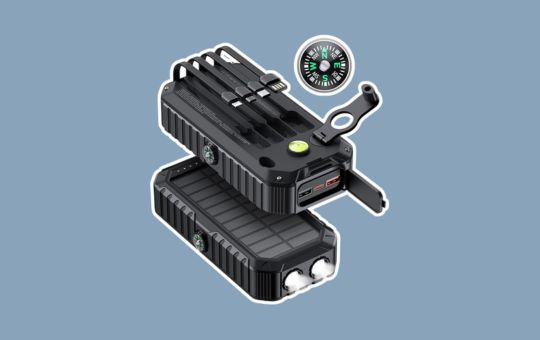
Best for: Campers, travelers, or anyone needing a high-capacity power bank with flexible charging options
When you first see the QiSa Solar Charger Power Bank, it almost feels like it’s trying to be a “survival kit in a brick.” Four built-in charging cables (plus multiple input ports), a hand crank, an oversized flashlight, and even a compass strapped to the side, it’s very much marketed as the all-in-one backup for people who camp, travel, or just want peace of mind during a blackout. On paper, it looks like one of the most feature-packed power banks in its class.
Now, the standout feature here really is the sheer number of built-in cables and ports. For anyone who’s ever fumbled through a drawer trying to find the right charging cord, or worse, realized you didn’t bring one on a trip, this setup feels like a lifesaver. Reviewers repeatedly highlight how convenient it is not to carry extra cords. And yes, that big flashlight on the side actually gets good marks for brightness, enough to light up a tent or small room.
But here’s the drawback. The solar panel and hand crank, two things that make the QiSa sound like a true off-grid champ, aren’t very practical in real-world use. Based on reviews and video demonstrations, the solar panel is far too small to meaningfully charge a 40,000mAh battery in any reasonable timeframe. It’s more of a “last resort trickle,” giving you just enough to send a text or check a map. The hand crank is similar, technically functional, but painfully slow. Imagine cranking for 10–15 minutes just to get a few percent back. Users who bought it thinking they could truly power it off the sun or crank alone were disappointed.
It’s also bulky. At over a pound (closer to 1.3 lbs), it’s not something you slip into a jeans pocket. More like something you toss in a backpack for camping, road trips, or emergency kits. One more subtle point: some reviewers mentioned the built-in compass being more decorative than reliable. Not a dealbreaker, but worth noting if you’re an outdoor enthusiast relying on it.
What Real Customers Say
✅ Pros
- Huge battery capacity (real-world still above average).
- Built-in cables reduce clutter.
- Bright flashlight is genuinely useful.
- Multiple input/output options for different devices.
- Compass and hand crank add emergency utility.
⚠️ Cons
- Solar charging is symbolic at best, too slow for full use.
- The hand crank feels more like a gimmick than a solution.
- Bulkier and heavier than standard power banks.
- Advertised capacity may not fully match real-world output.
Specs And Key Features:
| Price: | $59.99 |
| Battery: | 4000mAh Lithium Polymer Battery. |
| USB Input: | 5V/2A. |
| Solar panel Input: | 5V/3.1A |
| USB Output: | 5V/3.1A. |
| Wireless Output: | 5V/2A. |
| Solar Panel Wattages: | 12W. |
| Color: | Black. |
| Weight: | 1.3 Pounds. |
| Dimensions: | 7.2 x 4.33 x 1.81 Inches |
| Weatherproof: | Yes. |
| Key Features: | Fast Charging. |
4. Survival Frog: Solar Charger Power Bank
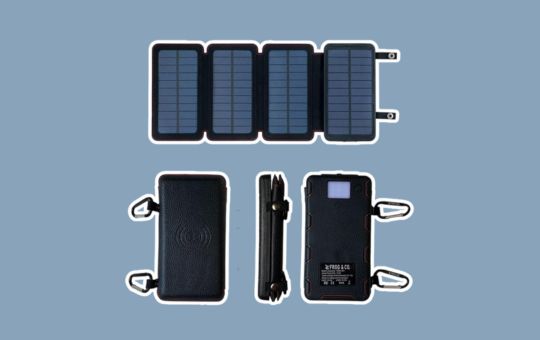
Best for: Day hikers, campers, or emergency preppers who need a compact unit with real solar topping and wireless charging.
The Survival Frog QuadraPro mixes a 8,000 mAh power bank with a four-panel solar setup capable of generating about 5.5 W, Qi wireless charging, dual USB ports, magnetic leather casing, hanging loops, and a built-in flashlight—all while weighing under a pound It’s best known for its clever blend of portability and practical design for outdoor use.
According to reviews, the 4-panel solar layout and stainless steel build are impressive for a device this size. Users especially like the magnets and carabiner loops for mounting the charger to backpacks or vehicles in direct sunlight .
In our research, although the 5.5 W solar rating sounds appealing, actual recharge is more of a slow “top-up” than rapid refuel. One field test reported only about a 5–6% battery gain in 20 minutes of peak light—a decent buffer, but not a full charge solution .
What Real Customers Say
✅ Pros
- Compact and lightweight at just under 16 oz
- Wireless charging + two USB ports—charge up to 3 devices
- Magnetic leather case and hanging loops for easy mounting
- IP-rated and rugged, with a helpful flashlight included
⚠️ Cons
- Solar recharge is slow: best viewed as an emergency top-up only
- Modest 8,000 mAh capacity compared to bigger banks, but it is the actual capacity, as other models may exaggerate
Specs And Key Features
| Price: | $79.97 |
| Battery: | 8000 mAh Battery. “Actual capacity” |
| Solar Panel Wattage: | 5.5W |
| Color: | Black. |
| Weight: | 15.8 Ounces. |
| Water-Resistance: | Yes. |
5. BLAVOR: Portable Solar Power Bank
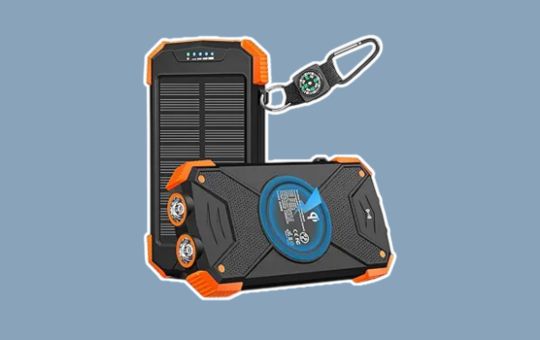
Best for: Casual users or light travelers who want a compact, straightforward solar charger for small devices.
The BLAVOR Solar Power Bank is a compact, entry-level portable charger that’s best known for blending affordability with just enough features for everyday or backup use. With a 10,000mAh battery capacity, it’s not the most powerful option on the market, but according to user reviews, it delivers dependable performance for light device charging, particularly phones, earbuds, or headlamps.
What makes it stand out is its built-in wireless charging pad, which many buyers found handy when cables aren’t around. It also comes with a small flashlight and compass (It can be inaccurate), thoughtful additions for casual camping or emergency kits. That said, the solar panel is limited in power, and most users agreed it shouldn’t be relied on as a primary charging method. Like most small-panel units, it’s best used in full sun for emergency trickle charging only.
According to our research, this product works well for day-trippers, commuters, or people who want a basic backup battery with bonus features. It’s not a high-performance charger for long outdoor excursions, but for basic needs, it covers the essentials.
Based on reviews and comparisons, the BLAVOR isn’t built for heavy-duty use, but for the price, it offers a thoughtful mix of utility and convenience. It’s a good entry-level choice for those dipping their toes into solar-powered gear.
What Real Customers Say
✅ Pros
- Wireless charging: works well for phones and earbuds
- Emergency-ready: Built-in flashlight is bright and useful at night
- Compact and lightweight: easy to pack or carry
⚠️ Cons
- Solar charging is very slow; best for emergencies only
- Low battery capacity compared to larger models
- Not ideal for charging tablets or multiple devices at once
Specs And Key Features
| Price: | $26.99 |
| Battery: | 10,000mAh Lithium Metal battery. |
| Color: | Orange. |
| Weight: | 10 Ounces. |
| Dimensions: | 5.9 x 3.1 x 0.8 Inches. |
| WaterProof: | IPX4. |
| Key Features: | MultiPurpose. |
6. Hiluckey: 25000mAh Portable Solar Charger

Best for: Campers, backpackers, or road trippers looking for a reliable, mid-range solar power bank with solid capacity and dual charging.
The Hiluckey 25,000mAh Solar Charger stands out for its foldable four-panel design, a feature that, based on reviews, makes a noticeable difference in solar charging efficiency compared to typical single-panel options. It’s a portable power bank built with outdoor use in mind, offering fast USB charging, rugged housing, and enough capacity to charge most phones 5–6 times before needing a refill.
According to users, one of the strongest features is its fold-out solar array. When fully deployed in direct sunlight, it charges faster than many compact solar banks, making it more viable for extended time off-grid. It also includes dual USB outputs and one USB-C port, so you can charge three devices at once, which many found helpful during hikes or group trips.
The main trade-off? It’s bulkier when unfolded, and some buyers noted it’s less convenient for casual, everyday use due to its larger footprint. Still, for people who prioritize function over portability, like campers or those prepping for emergencies, the trade-off is often worth it.
In our research, this charger hits a nice middle ground: not too basic, not overbuilt, and reliably reviewed for what it promises. If you’re heading off-grid for a few days or want an emergency-ready charger with real solar functionality, the Hiluckey earns its spot on the list.
What Real Customers Say
✅ Pros
- Charge multiple devices at once: Dual USB outputs support simultaneous charging
- High-capacity battery: 25,000mAh capacity provides multiple phone charges
- Rugged design: Durable and water-resistant build for outdoor use
⚠️ Cons
- Solar charging is okay; Solar still requires direct sunlight for meaningful results
- Bulkier when unfolded: better suited for travel packs than pockets
- No wireless charging
Specs And Key Features
| Price: | $46.99 |
| Battery: | 25000mAh |
| Max Input: | 5V/2.1A. |
| Max Output: | 5V/2.1A. |
| Solar Panel Wattage: | 6W. |
| Color: | Orange. |
| Weight: | 1.19 Pounds. |
| Dimensions: | 21.3 x 8.7 x 15.4 Inches. |
| Weather-Resistance: | Yes. |
| Key Features: | 4 Foldable Solar Panels. |
7. GOODaaa Portable Solar Power Bank – 36,000mAh with Wireless Charging & LED Light
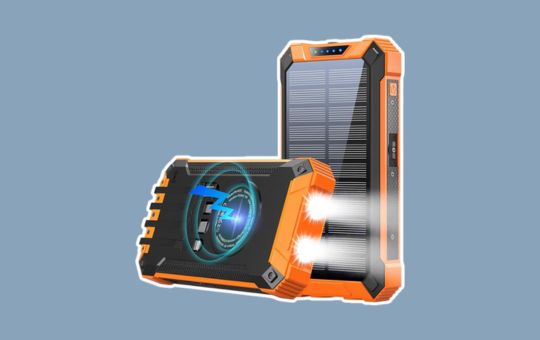
Best for: Travelers and adventurers who prioritize high-capacity backup power and wireless convenience in a rugged design
The GOODAAA 36,000mAh Solar Power Bank is a large-capacity portable charger designed to handle multiple devices at once, ideal for trips, emergencies, or extended time away from outlets. According to reviews and spec comparisons, its biggest appeal is how much charging it can offer before needing to be topped off. The device supports wireless charging, multiple output ports (including USB-C), and even has a built-in flashlight, making it a functional all-in-one unit for people on the go.
In our research, one standout feature is the wireless charging pad, which is especially helpful when all your cables are in use or when you want to charge your phone without adding extra clutter. According to users, it works reliably with most Qi-enabled devices and adds a layer of convenience, especially during travel or outdoor use.
That said, solar charging is its weak spot. Like many power banks with a built-in panel, the solar input is more of a slow emergency trickle than a practical recharging method. Users consistently recommend relying on USB charging for regular use and treating the solar panel as backup only.
Overall, this model suits people who carry multiple devices, phones, tablets, GPS units, or small gadgets. and want the peace of mind that comes with ample backup power. It’s not the lightest option, so it’s better suited to car camping, basecamps, or as part of an emergency kit than lightweight backpacking.
What Real Customers Say
✅ Pros
- Charge multiple devices at once: Multiple ports, including USB-C
- Wireless charging: Qi pad adds cable-free convenience
- High-capacity battery: 36,000mAh powers most phones several times over
- Rugged design: Designed for outdoor use, includes a flashlight
⚠️ Cons
- Slow solar charging: Best used for emergencies only
- Bulky: Heavier than compact models; not ideal for ultralight travel
Specs And Key Features
| Price: | $35.99 |
| Battery: | 36000mAh. |
| Max Output: | 5V/3A. |
| Color: | Orange. |
| Material: | ABS & PC. |
| Weight: | 1.4 Pounds. |
| Waterproof: | IPX5. |
| Key Features: | Fast Charging. |
| Climate Status: | Climate Pledge Friendly. |
8. Jinepin 46,800mAh Solar Charger Power Bank

Best for? The Jinepin fits best with campers, road-trippers, or anyone who wants a semi-stationary backup that can be charged at home and topped up outdoors. The SOS light also makes it appealing for emergency kits. It’s less practical for lightweight hiking or anyone hoping for fast solar-only charging.
The Jinepin Solar Charger Power Bank is another one of those oversized portable batteries promising to do just about everything: big capacity, foldable solar panels, built-in cables, and even an SOS camping light. What it’s best known for is that 46,800mAh capacity, which puts it in the same league as other jumbo solar banks. Based on reviews, it does deliver several full phone charges (7–9 on average, depending on the device), and with wall charging it feels reliable. Solar, though… that’s where expectations need a reset.
The standout feature here is the built-in cables paired with a clear LED display. According to users, not having to dig around for cords is a real convenience, and being able to glance at an actual percentage (instead of vague blinking dots) gives a sense of confidence. It feels like a small detail, but in the field it matters.
The main drawback? Bulk, again. With three fold-out solar panels, this charger is not something you slip in a pocket. Some buyers even called it “clunky” to carry. And while those extra panels do improve solar intake compared to single-panel banks, our research shows they still can’t realistically recharge the full battery quickly. You’ll get useful top-ups in bright sun, yes, but a full solar recharge takes days.
What Real Customers Say
✅ Pros
- Large 46,800mAh capacity for extended backup
- 3 foldable solar panels (better than single-panel trickle chargers)
- Built-in cables + USB-C fast charging
- LED display shows exact battery percentage
- SOS camping light adds emergency functionality
⚠️ Cons
- Bulky and heavy to carry long distances
- Solar charging still slow despite extra panels
- Charging the full battery takes many hours by wall outlet
- Light is functional but not a substitute for a real lantern
Specs And Key Features
| Price: | $42.99 |
| Capacity: | 46,800mAh lithium battery |
| Charging: | PD 20W fast charging via USB-C, multiple ports |
| Solar panels: | 3 foldable panels for better input than single-panel models |
| Built-in cables: | 4 (USB-C, Lightning, Micro USB, USB-A) |
| Display: | LED digital screen showing remaining battery |
| Extras: | SOS camping light, rugged build. |
9. Kepswin 49,800mAh Solar Charger Power Bank
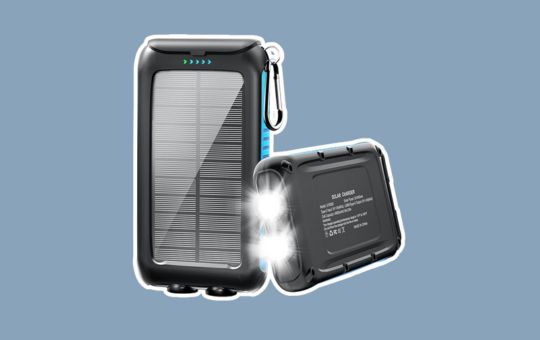
Best for? The Kepswin makes sense for people who want a high-capacity, durable backup power supply. Road trippers, campers with car access, households prepping for power outages, those groups benefit most. It’s less suited for ultralight hikers or anyone expecting “free” endless power from the sun.
The Kepswin Solar Charger Power Bank is one of those oversized backup batteries that seems designed for the “just in case” drawer at home as much as for camping trips. What it’s best known for, and what grabs people at first glance, is the sheer number stamped on the label: 49,800mAh. Nearly 50k. On paper, that’s enormous. In practice, based on reviews, it does hold a lot of juice (enough to run a smartphone for a week if you’re careful), but it doesn’t always live up to the marketing math.
The standout feature? Durability. Unlike some other oversized solar banks that feel delicate, this one gets praise for being tough. According to users, the casing can handle bumps, splashes, even a drop into damp grass without panic. It feels more like a field tool than a fragile gadget. That makes it a decent candidate for camping trips, festivals, or keeping in an emergency kit at home.
But here’s the thing: the solar panel looks impressive in photos, but it’s really undersized compared to the battery. You’re not going to refill nearly 50,000mAh from sunlight unless you leave it out for, well, ages. Based on reviews, the panel trickles in just enough to stretch your phone through a sunny afternoon, but a full recharge? Not happening. Think of it as a lifeline in a pinch, not a main power source.
And then there’s the weight. More than one buyer described it as “like carrying a brick,” which makes sense given the capacity. Perfectly fine if it’s sitting in a glovebox or emergency kit, not so fine if you’re hauling it on your back for miles. The flashlight’s there too, and while it’s handy for poking around in a tent or finding gear in the dark, it’s not meant to replace a proper camping light. More of a bonus than a feature, you’d buy it for.
What Real Customers Say
✅ Pros
- Holds a lot of charge, enough for days of phone use
- Rugged and water-resistant build that doesn’t feel fragile
- Multiple charging ports + flashlight make it versatile
- Affordable compared to other oversized packs
⚠️ Cons
- Solar panel far too small for full recharging
- Heavy, not great for travel where every ounce matters
- Flashlight is basic, not a strong selling point
- Charging the full battery from a wall still takes many hours
Specs And Key Features
| Price: | $27.99 |
| Capacity: | 49,800mAh lithium battery |
| Charging speed: | 15W USB-C fast charge + multiple USB outputs |
| Durability: | IPX5 water-resistant shell, shock-resistant build |
| Extras: | Built-in LED flashlight, solar panel, rugged casing |
| Compatibility: | Works with phones, tablets, small USB devices |
10. SOARAISE 48000mAh Solar Charger Power Bank
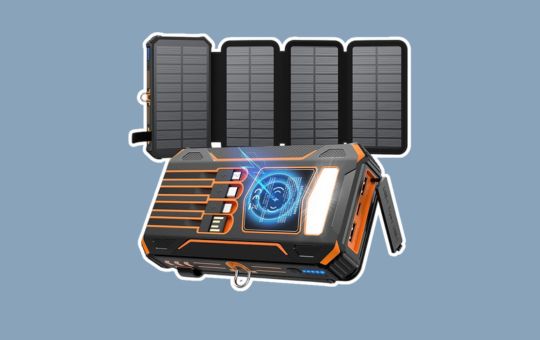
Best for? SOARAISE makes the most sense for road trips, camping near a car, or as a backup emergency power source at home. It’s not ideal for ultralight hikers or anyone expecting fast, solar-only charging. Think of it as a huge rechargeable power station that also happens to have solar as a supplement.
The SOARAISE Solar Charger Power Bank looks like one of those “do-it-all” gadgets you’d want on a camping trip: a chunky 48,000mAh battery pack with four fold-out solar panels, wireless charging, built-in cables, and even a flashlight tucked into its design. On paper, it sounds like the Swiss Army knife of portable power. In reality, our research shows that while some parts of this promise hold up, others… not so much.
Let’s start with what it is best known for: sheer capacity. Forty-eight thousand milliamp hours is massive, in theory, enough to charge a modern smartphone 8–10 times or keep a tablet alive through a weekend.
According to users, the capacity feels close to accurate when charged fully from the wall. The real caveat comes with the solar panels. Yes, there are four of them, and they do expand charging potential beyond the typical “emergency-only” single panel you see on cheaper solar banks. But solar input here is still slow. Even in good sunlight, reviews and video demonstrations suggest it takes days, not hours, to fully replenish that giant battery. So while the solar panels are useful for topping off (keeping a phone alive in the woods, for instance), this is not a product you’d want to rely on exclusively for solar charging.
The standout feature? The inclusion of built-in cables alongside wireless charging. A surprising number of power banks still make you fumble for cords. Here, everything’s tucked in, no digging through a bag at dusk. That kind of design foresight does matter, especially when traveling light.
The drawback is equally clear: size and weight. Based on reviews, this unit is heavy and bulky. With all panels folded, it’s more brick than pocket pack. That’s fine if you’re car camping, but less practical for backpackers who count every ounce. Some buyers also noted inconsistent quality with the wireless charging pad, it works, but alignment is finicky, and you might find yourself nudging the phone around to “catch” the charge.
What Real Customers Say
✅ Pros
- Massive 48,000mAh capacity (holds power for days)
- Built-in cables + wireless charging pad for convenience
- Four solar panels, better than single-panel models for outdoor recharging
- PD & QC 3.0 support (faster charging for modern devices)
⚠️ Cons
- Heavy and bulky, not backpack-friendly
- Solar charging is very slow for full battery replenishment
- Wireless pad can be finicky in alignment
- Some users question long-term durability
Specs And Key Features
| Price: | $42.29 |
| Capacity: | 48,000mAh lithium battery |
| Charging: | PD + QC 3.0 fast charging via USB-C (up to 22.5W, according to specs) |
| Wireless charging pad: | 10W (Qi-compatible) |
| Built-in cables: | Four (USB-C, Lightning, Micro USB, and USB-A) |
| Solar panels: | 4 detachable fold-out panels |
| Extras: | LED flashlight, water-resistant casing, rugged build for outdoor use |
Common FAQ
In this section, we’ve gathered answers to some of the most frequently asked questions about solar power banks and their features. Whether you’re new to solar technology or looking for specific details on how these devices work, you’ll find helpful insights to make informed decisions. Browse through the questions below to get clarity on your queries and enhance your understanding of portable solar charging solutions.
How does a solar power bank work?
In Brief, Solar energy is the electrical power that is derived from sunlight. The conversion of this power can either be directly using photovoltaics or indirectly through a concentrated solar panel system. These solar panel systems make use of lenses or mirrors to focus sunlight on a small beam.
When we talk of solar power chargers, the name says it all; it is a battery storage unit of power that derives its energy directly from sunlight. They can be very useful during trips or when there are power shortages. They are becoming popular as each day goes by as more smart devices are being invented and they need more power to work and last for a day. Generally, the power banks act as a backup.
Most people who own a solar charger power bank do not know how they work, and it is very rare to find a seller explaining to a customer how these gadgets work. Solar power banks have special lenses that concentrate the sunlight on a small beam to charge the batteries inside. The battery has a circuit that controls the power flow obtained from the sunlight. These batteries store the electrical energy converted from the sun, which is later used to charge various electrical devices like mobile phones.
What are the advantages of using a solar power bank?
You can use them anywhere! As you know, there are no wires needed with a solar-powered device. You only need to find enough sunlight and place your charger in direct sunlight to charge it up. No matter where you are in the world, you can find some sunshine if you wish to charge your phone or laptop.
They’re environmentally friendly! Another advantage of using solar-powered devices is that they’re environmentally friendly; there’s no pollution from them whatsoever since they don’t release any carbon dioxide into the air like other batteries do when they’re depleted and thrown away after use (because there’s no way for them to be recycled).
They’re durable! Solar-powered devices are also very durable compared with other types of chargers because there are no moving parts inside them (unlike regular batteries). Therefore, there’s no chance of them breaking down quickly.
What are the disadvantages of using solar power banks?
Solar panels take a long time to charge up. If you’re planning on using your solar power bank for emergency purposes, you might be disappointed by how much time it takes for the device to fully charge. Most solar panels can only generate about 2-3 watts per hour — meaning that it could take up to 10 hours for the device to reach full capacity when exposed to direct sunlight.
Another disadvantage of solar power banks is that they are generally quite bulky and heavy compared to regular power banks which don’t rely on solar energy. This means that they’re not always ideal for carrying around in your pocket all day long!
Benefits of using a solar-powered battery charger
Solar battery packs are the most energy-efficient and economical devices that someone can have. They no doubt make life so much easier. There are numerous benefits that they bring to our lives. They include;
1. They can charge without any electrical input. This means that they have no associated costs that they bring along.
2. They can be used anywhere, You just need to have access to sunlight.
3. They are very versatile and can charge any basic gadget. You will never have to worry about any electrical shortages as the sunlight will always be present even for a little while.
How to take care of your solar power bank?
- Keep it dry and clean.
- Don’t leave it in direct sunlight for a long time.
- Unplug the charger when not in use.
- Don’t throw it around or drop it from high places, especially on hard surfaces like concrete or asphalt, as this could cause damage to its internal components or battery cells.
- Don’t immerse your solar charger in water, or let any water get inside the unit (e.g., rainwater). The water could damage the internal circuitry of the solar charger and/or its battery cells. If your solar charger gets wet by accident, immediately disconnect it from any charging device (such as a laptop), then wipe off any moisture with a soft cloth before reconnecting it to charge again.
What are the types of solar energy chargers?
There are many manufacturers, and all of them have different concepts and designs. As a result, there are various models and types in the market. These are the most popular types:
1. Small, portable models that are designed to charge a wide range of small devices, including cell phones, mobile phones, iPods,s or any other small portable gadget.
2. The fold-out models are designed for automobiles. They sit on the dashboard and are plugged into the cigar lighter socket to charge the vehicle battery when it is not in use.
Related: Solar Car Battery Charger kits
3. Public chargers are installed in public places for people to use for free.
Next, we will discuss and feature the 10 best solar power chargers of the first type which are Small portable models.
Why You Can Trust This Review?
We understand that not everyone has the time to dig through pages of reviews, watch product demos, and compare specs across dozens of solar chargers. That’s why we’ve taken the time to do just that. This guide is based on extensive research, pulling insights from verified buyer reviews, detailed spec comparisons, and video demonstrations.
While we haven’t tested this charger first-hand, we aim to give you a clear, honest picture of what to expect from people who actually bought and used it.
Conclusion
Honestly, finding the best solar power bank isn’t about chasing the one with the most features or the flashiest design; it’s about what works when you need it. Whether that’s something tough for hiking or just a reliable charger for day-to-day stuff, it’s worth picking something that won’t give up on you. A lot of these devices promise a lot, but only a few deliver consistently. Hopefully, this list saves you some time and hassle, because digging through dozens of listings can get exhausting fast.
If you’re into greener living or just looking for smart swaps that make a difference, we’ve also got a guide on eco tech products, and if you’re heading off-grid, check out our picks for camping-ready solar chargers. Want to understand how all this solar stuff works? Here’s a simple breakdown: how solar energy powers your gear.
Stay prepared, stay powered, and as always, stay Earthava.


